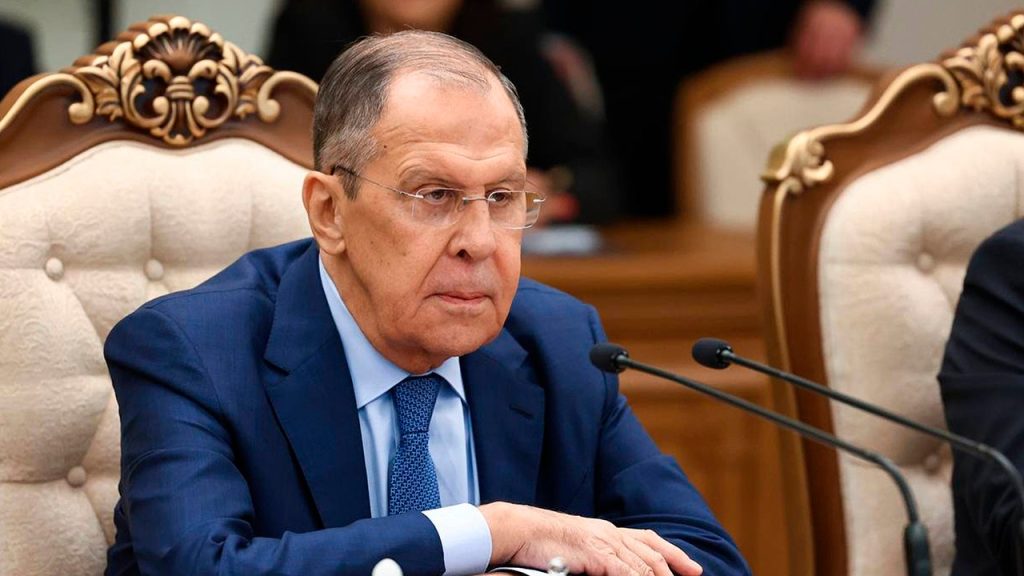During a significant address at the United Nations General Assembly on Saturday, Russian Foreign Minister Sergey Lavrov delivered a potent warning to Western powers, accusing NATO and the European Union of engaging in a “real war” against Russia. Lavrov’s speech utilized historical references, particularly to World War II, to assert Russia’s role as a defender of national sovereignty, while concurrently criticizing the U.S. for undermining postwar principles through military interventions. The speech highlighted prevailing international tensions, especially in light of ongoing conflicts in the Middle East and the ongoing war in Ukraine. This address serves as a crucial reflection of Russia’s foreign policy stance amidst escalating global confrontations.
| Article Subheadings |
|---|
| 1) Historical Context of Lavrov’s Address |
| 2) Charges Against NATO and the EU |
| 3) Current Global Tensions and Responses |
| 4) Lavrov’s Views on Western Sanctions |
| 5) Russia’s Position in Global Politics |
Historical Context of Lavrov’s Address
During his speech at the United Nations General Assembly, Sergey Lavrov invoked historical parallels to World War II. He positioned Russia as the successor to the Soviet Union’s legacy in combatting fascism and defending national sovereignty. This historical framing served a dual purpose: reinforcing Russia’s image as a protector of global peace while simultaneously critiquing Western interventions that he argues have eroded global stability. By referencing these events, Lavrov aimed to illustrate a narrative where Western powers have consistently undermined international norms established after the war, thus justifying Russia’s stance against what he views as unjustified aggression by NATO and its allies.
Charges Against NATO and the EU
In his address, Lavrov accused NATO and the European Union of violating long-standing commitments related to European security. He asserted that Russia has “never had and does not have” intentions to launch an assault on NATO territories, characterizing Western fears as unwarranted provocations. By labeling NATO’s military expansion and maneuvers in Eastern Europe as indicative of a broader strategy to encroach upon Russian sovereignty, he sought to reshape the narrative that portrays Russia as the aggressor. Lavrov’s assertion reflects a defensive posture, positing Russia as the victim of a geopolitical strategy aimed at containment and destabilization.
Current Global Tensions and Responses
The timing of Lavrov’s message was particularly noteworthy given the heightened tensions observed along NATO’s eastern border. Reports of Russian aircraft violations in airspace over Estonia and recent drone interceptions by NATO forces in Poland contribute to an environment rife with escalation. Amidst this backdrop, the U.S. reiterated its commitment to defend every inch of NATO territory, signaling a firm stance against perceived Russian threats. Lavrov’s speech underscored a narrative suggesting that any potential conflict with NATO is not merely a regional dispute but a critical existential threat to Russia, thus amplifying the stakes involved.
Lavrov’s Views on Western Sanctions
Lavrov also took the opportunity to denounce the imposition of Western sanctions, particularly those aimed at Iran. He characterized U.S. efforts to reinstate or tighten sanctions as both illegal and part of a broader strategy of blackmailing nations that resist U.S. hegemony. He highlighted the West’s obstruction of diplomatic avenues to restore the Iran nuclear deal, depicting these actions as part of a strategy to ensure Western dominance at the expense of global security and cooperation. Lavrov’s comments reflect a broader Russian critique of how Western powers manipulate international relations to serve their interests.
Russia’s Position in Global Politics
Finally, Lavrov’s speech was characterized by an appeal to a “global majority” resistant to Western influence, calling attention to alliances like BRICS and the Shanghai Cooperation Organization which are positioned as counters to Western geopolitical narratives. He stressed that Russia aligns itself with nations from the Global South seeking greater representation in international decision-making bodies, particularly the U.N. Security Council. By promoting this narrative, Lavrov aims to portray Russia not merely as a regional power but as an integral player in reshaping the geopolitical landscape to foster a multipolar world free of Western dominance.
| No. | Key Points |
|---|---|
| 1 | Lavrov’s address emphasized historical parallels to World War II. |
| 2 | He accused NATO and the EU of pursuing a real war against Russia. |
| 3 | Russian officials reiterated their lack of intent to attack NATO countries. |
| 4 | Lavrov condemned Western sanctions and interventions in various conflicts. |
| 5 | Russia seeks to align with a rising global majority against Western hegemony. |
Summary
The address by Sergey Lavrov at the United Nations General Assembly marks a pivotal moment in Russia’s foreign relations, highlighting both its grievances against Western powers and its aspirations in a multipolar global order. With rising tensions at Europe’s eastern front and ongoing conflict in Ukraine, Lavrov’s remarks serve to consolidate support among nations opposed to Western dominance while framing Russia’s actions as defensive rather than aggressive. This evolving geopolitical landscape necessitates attentive observation, as the rhetoric from Moscow could presage further complications in international relations.
Frequently Asked Questions
Question: What was the main theme of Lavrov’s speech at the UN General Assembly?
Lavrov’s speech centered on accusing NATO and the EU of engaging in a war against Russia, using historical references to frame Russia as a defender of national sovereignty and critic of Western interventions.
Question: How did Lavrov characterize NATO’s actions towards Russia?
He described NATO’s actions as provocations and claimed they ignored longstanding security commitments, painting Russia as a victim of unjust aggression rather than the aggressor.
Question: What was Lavrov’s position on Western sanctions?
He condemned Western sanctions as illegal and part of a broader strategy to maintain U.S. dominance, arguing that they undermine global diplomatic efforts.
